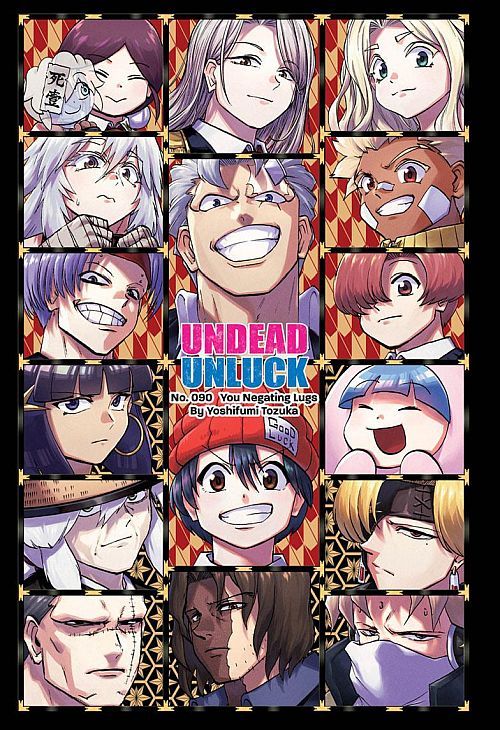The past few years, the word trauma has been thrown around a lot. Everyone’s going through something. While one can argue who is suffering more, there’s one thing that’s certain – we still don’t know how to talk about trauma in a healthy manner that heals everyone involved.
And I see this in the case of the Negators in Yoshifumi Tozuka’s Undead Unluck.
Undead Unluck starts off with a young girl named Fuuko Izumo wanting to kill herself after causing a lot of death around her. She curses how unlucky she is until a mysterious person named Andy shows up to save her. Andy is someone who is looking to die as he is living a virtually-immortal existence. He believes Fuuko is the key to dying and decides to drag her on an adventure that would end up joining an organization made up of people with unique powers like themselves called Negators.
The Negators are individuals that have abilities that negate certain rules placed by the God of their world and by beings known as Uma. These abilities usually start with an “Un-” prefix, so Undead and Unluck are on the list. How those abilities are activated can be random, but there’s consequences. Once Negators awaken to their power, they end up causing tragedy to those they love and most of the time, they kill them.
I’ll talk about 3 Negators in particular.
Fuuko Izumo (Unluck) – Due to her ability to generate extremely bad luck on those she loved the most, her parents were killed in an airplane crash when she was 8 and with them. Three years later, Fuuko kissed her grandfather and he ended up dying some time after
Tatiana (Untouchable) – Her Negator ability activated at the age of 5 and destroyed an entire town as anything near her would be incinerated, including her parents.
Chikara Shigeno (Unmove) – When his Negator ability activated, he accidentally caused his parents to not be able to move by looking directly at them in front a speeding truck. Hence their imminent deaths.
You can guess why I want to talk about those 3 in particular – because they accidentally killed their parents.
In mental health, there have been cases of people living with mental illness who killed their family members. While this may not be shocking to some, it’s still harboring to hear and a risque subject to talk about. Years ago, while working the front desk at my local NAMI, I took a phone call from a woman who was looking to inquire about what to do regarding her brother, who killed their parents. She was in tears and I said I understood and transferred her over to the helpline.
I recently listened to two stories about people who accidentally took the lives of others. One story focused on a woman who ran over a homeless person near an expressway. While she was mourning the loss and processing what she did, everyone around her was like “Oh, that person was just an outcast to society. You don’t need to mourn them.” The woman didn’t know how to take that. The second story was about a man who was struggling with alcohol addiction for years. Things came to a head when he killed a small group of family members while drunk driving. While the man is making amends through advocacy work against drunk driving, he can’t help but wonder if he will truly be forgiven for what he did.
What’s scary is when you accidentally kill someone, it’s easy to let the trauma define your entire identity. Fuuko, Tatiana and Chikara were like this before meeting Andy. They were afraid that their powers couldn’t help anyone. They felt that they couldn’t redeem themselves no matter what. If the 3 of them can’t get close to anyone anymore, then so be it.
Thankfully, all three have managed to find ways to cope and grow. Fuuko realizes how much her power can save lives and knows how much her parents loved her. The best thing Fuuko can do was live and protect those she cares about just like her parents once did. Tatiana felt the same after Fuuko befriends her without judgement of her past actions. Chikara admits that his parents want him to live first and foremost while being kind to those who need it.
I will not lie that society will always judge anything violent in a black or white manner. I just wish that those who know they did something devastating are treated with compassion by more than just people similar to them. In Undead Unluck, the Negators only get sympathy from fellow Negators. The God who “blesses” them only sees them as pawns to be played with.
It’s okay if you can’t forgive yourself as long as you don’t fall into total despair. Try to make the world around you a better place. If you can’t, then definitely make your inner world a better place. And definitely find a community that you can feel safe and at peace with. This is why I appreciate Undead Unluck and understand why it was made a big deal at Anime NYC in 2023. Community (and some professional help) goes a long way to heal the trauma.
And more importantly, try to honor the victims as best you can. Do good for their sake.
There’s absolutely no good card for this at all, but shrinking yourself to the abyss and wanting to die like some Negators have felt is not a good answer to live up to any grave mistakes you made. Do the UN-believable and prove to the awful voice that unfairly blames you that you are so much more than what you did.
If you are or know someone who accidentally hurt or killed someone, the Hyacinth Fellowship is a place to find help and I totally recommend visiting their website at: https://hyacinthfellowship.org/
